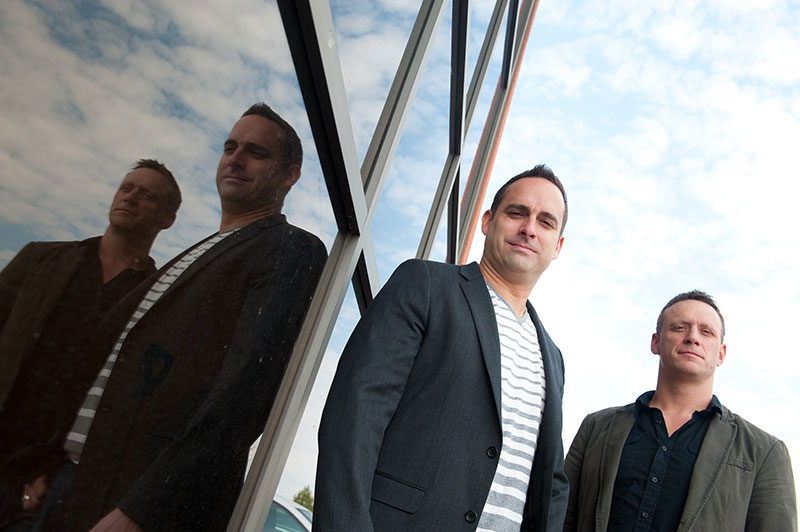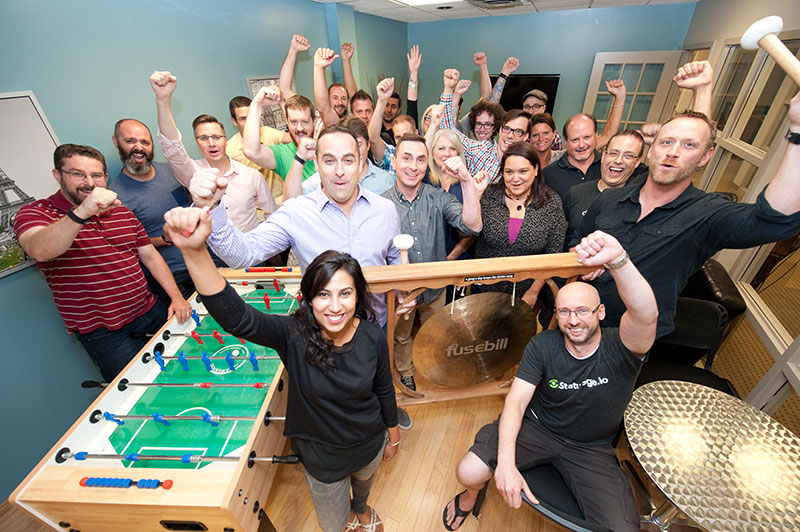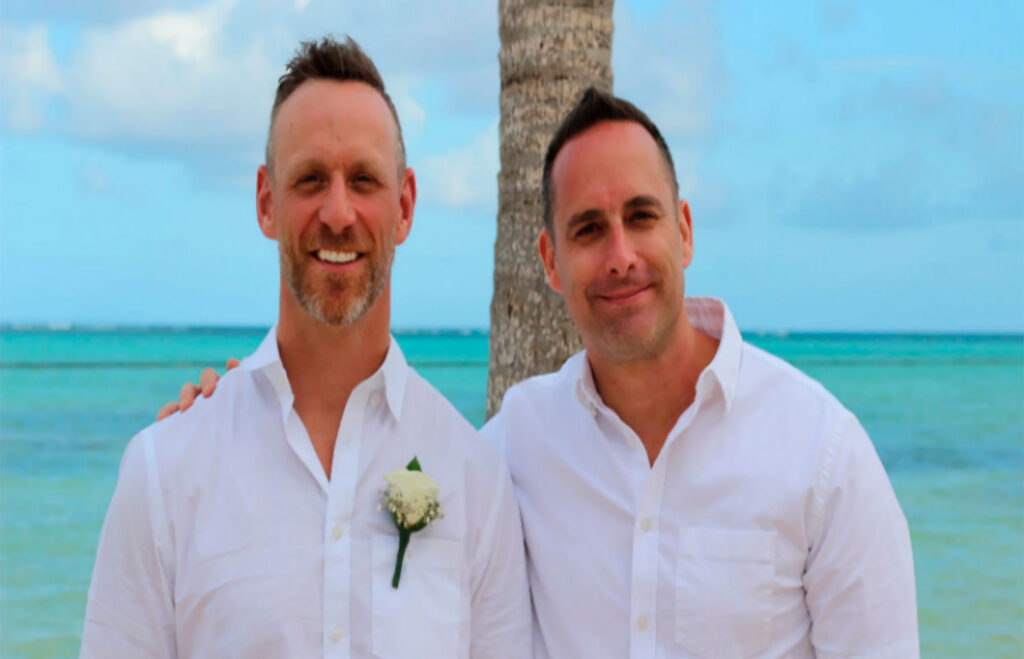We’ve all heard horror stories of SaaS co-founder relationships gone awry: the sunken start-ups, the broken friendships, the legal battles…
That may be the narrative that makes for the most dramatic headlines, but it isn’t the only one.
Co-founding a SaaS business can also be the adventure of a lifetime. It’s an opportunity to build something big from the ground up and to forge a meaningful partnership that’s [almost] as strong as they come.
If you have a big fear of commitment, a low threshold for incredibly stressful situations, or a difficult time making compromises, then co-founding a SaaS business probably isn’t for you.
But if you have a great idea, the right attitude, and you choose your partner wisely, the sky really is the limit in the world of SaaS.
Back in 2011, two guys from Ottawa decided to take that leap and co-found a SaaS business based on a pain point they knew existed in the market. And with a well-established friendship and a strong mutual respect as the backbone of that decision, they’re still going strong today.

Stax Bill has been simplifying subscription billing for a decade now. To celebrate the milestone, I spoke with CEO and Co-Founder Tyler Eyamie and CTO and Co-Founder Greg Burwell to get some insight on:
- the ways they’ve kept their SaaS co-founder relationship strong over the years
- how that relationship has impacted the growth and success of the business, and
- advice they have for those just getting started or those who may already be in the thick of it.
Here are seven tips for building a strong co-founder relationship that stands the test of time from two SaaS leaders who’ve been there and done it.
1. Always choose your co-founder wisely.
Before the days of Stax Bill, Eyamie and Burwell worked at the same SaaS business, Protus, for nearly a decade. They got to know one another over the years both professionally and then socially on the golf course, and they gained an appreciation for each other’s strengths and capabilities.
But when Protus was acquired in February 2011 for $213 million, they had to make a decision: Find their next jobs “workin’ for the man” or create their own path forward.
During their time at Protus, Eyamie and Burwell had seen first-hand the struggles large SaaS businesses face working with homegrown billing solutions. In fact, at the time the company sold, there were eight people devoted solely to managing its homegrown billing system.
They knew there had to be a better way. And this became the initial idea that turned into a whole lot more.
Two months later, as they say, Eyamie and Burwell took their relationship to the next level.
Their best advice for someone looking for a co-founding partner?
“Be prepared to spend a lot of time together and make sure it’s someone you like,” laughed Burwell.
2. Leverage each other’s skillsets.
A strong SaaS co-founder partnership starts with individuals who have complementary skills, said Burwell.
“There are some people you just work well with, and Tyler happens to be one of those people for me.”
Burwell brought his technical chops into the partnership, while Eyamie came with experience in sales management and business development.
“It felt like a very natural fit,” said Burwell. “He’s obviously better at certain things than I am. And I’m better at certain things than he is. But it works and it comes together. From the beginning we thought, ‘this makes sense. Why wouldn’t we do this?’”
3. Stay true to yourself and your partnership.
In the first fifteen months, they hired an ‘outside gun’ to come in as Stax Bill’s CEO.
Spoiler alert: it didn’t work out.
“He just didn’t have the ownership, the accountability, or the passion for fighting for the business that Greg and I had,” said Eyamie. So that’s when Eyamie stepped into the role from his position of President.
“For me there was a process of learning how to be the right CEO—not the CEO people say you should be, but trusting my gut,” said Eyamie.
This was a lesson they had to learn together as well. There can be a lot of stress and rejection in the early days of scaling a SaaS business. Learning how to come to terms with it as individuals and not letting it affect them as a team made both their partnership and the business stronger.
“We both just continued being there and supporting each other,” said Burwell. “If we didn’t do that Stax Bill probably wouldn’t be celebrating its 10-year anniversary, that’s for sure.”
4. Remain open, honest, and transparent.
There’s going to be conflict in a SaaS co-founder relationship. It’s kind of unavoidable. But you can approach conflict in either a positive way to move the ball forward or in a negative way that holds you back.
“I’m not gonna say it’s always been rainbows and unicorns between us,” said Burwell. “We’ve had our disagreements and we’ve had our challenges. But one thing I’ve always appreciated is we’ve both been able to discuss work together very clearly and calmly, treat each other with respect, and just be good to one another.”
Having that best interest at heart for both the business and each other has served them well, helping to keep their friendship strong and their business partnership on equal footing.
“Over the years we’ve both been open enough to know that even if we feel strongly about one thing, it might not be the right thing for the business or the other co-founder,” said Eyamie. “We’re equals marching in this together. We’re both putting in the same grind, and it has always been important for us to maintain that dynamic of inclusion.”
5. Give your fellow co-founder the space they need.
The SaaS world moves at lightning speed. But when you’re working in a partnership, it’s important not to force things.
“People need time and space to process information. It’s best never to make any knee-jerk reactions,” said Burwell. “A lot of the time when we have a sensitive or challenging topic to discuss with each other, we lead off by saying, ‘take the weekend or the next few days to think about it’.”
Co-founders spend a lot of time working closely together. But sometimes it’s best to step away, consider the issue at hand, and then circle back when the time is right.
“The biggest thing is keeping an open mind. If you aren’t able to take each other’s ideas and opinions into account, it’s going to be difficult,” said Burwell.
Both co-founders joke about how they call each other their “work husbands”.
“For the past 10 years, I’ve spent about eight hours a day with my wife, eight hours with Tyler, and eight hours sleeping every day. So yeah, it’s basically a marriage,” said Burwell.
Eyamie agrees.
“You definitely have to learn where to poke and where not to poke and how to get things done with the other person while knowing that we’re both obviously two very strong-minded people.”
6. Know when to bring in an outside opinion.
When difficult situations come up—and they always do—even the most open, honest, and transparent people can sometimes find it challenging to come to a mutually agreeable solution. That’s when you need insights and opinions from people who aren’t working with you in the trenches.
“It’s important to have some kind of a methodology for dispute resolution,” said Eyamie. “Having a board, an independent advisor, or somebody who can offer that outside perspective can really help.”
Eyamie and Burwell have had their differences of opinion and have gotten stuck on things here and there through the years, but there was never a moment when they got close to calling it quits, they said.
“We have always both been 100% committed to hitting the top of the hill,” said Eyamie.
7. Remember to celebrate the wins.
This is one piece of advice both cofounders wish they’d taken more to heart.

“We’ve always said let’s make a point to celebrate the high times,” said Burwell, “but we probably could have done a better job doing that.”
One of the most memorable moments for Burwell was a year into the business when he and Eyamie raised a friends and family round of financing for Stax Bill.
“We had a couple of individuals that were coming to us writing pretty sizable checks.” he said. “It was very humbling and surreal to be like, ‘wow, they’re just giving us their money. They trust us and believe in us that much. Tyler and I have talked about that so many times over the years.”
While every financing milestone has been huge along the way, the product development milestones have been pretty satisfying as well.
“I still have the cork in our office from when we cracked champagne on 11/11/11. It was the first live release of the Stax Bill product,” said Eyamie.
An important milestone in the SaaS co-founder relationship
Fast forward to 2021 which brought a life changing win for Eyamie and Burwell as founders, as well as for the business as a whole. Florida-based integrated payments technology provider, Stax—formerly Fattmerchant—made a strategic investment in Stax Bill backed by Greater Sum Ventures.
“It put an exclamation point on the end of everything we’ve accomplished so far and confirmed that all of the time, effort, and stress have been worth it,” said Eyamie. “Greg and I have gone through a serious 10-year journey together and the majority of start-ups never get to this huge milestone.”
Eyamie and Burwell consider it a successful exit from a founding perspective, and it’s a big feather in the cap of their partnership.
“There have been a lot of ups and downs in our Stax Bill journey, but I would not change a single thing,” said Burwell. “This entire experience, along with my partnership with Ty, continues to be absolutely invaluable to me.”







